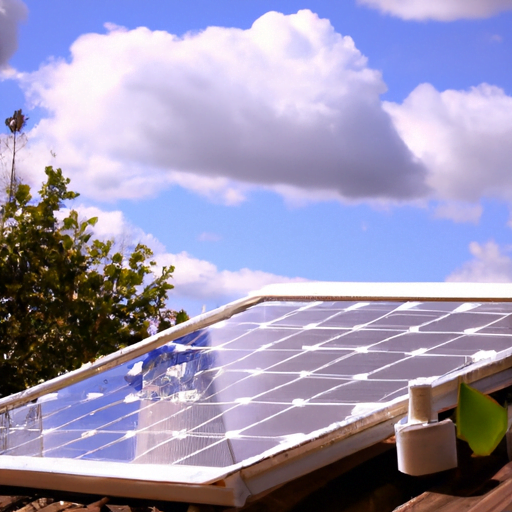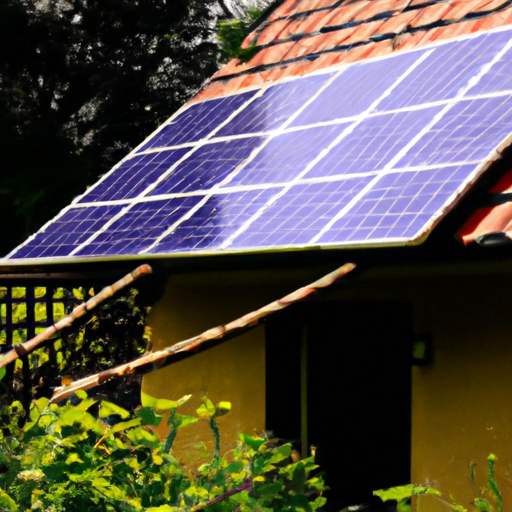So, have you ever thought about what it would be like to live off the grid? You know, no electricity, no running water, just relying on the resources around you. It’s definitely a lifestyle that’s becoming more popular, but have you ever wondered just how many people in the world are actually living off the grid? Well, in this article, we’re going to take a closer look at the global numbers and give you a better understanding of this unique way of life.
Living off the grid is basically when you choose to live without any public utilities, like electricity or running water. It’s all about self-sufficiency and relying on renewable energy sources, like solar panels or wind turbines. And let me tell you, it’s not as easy as it sounds. But there’s something appealing about being completely independent and disconnected from the modern world, right?
Now, let’s get to the numbers. It’s estimated that around 1.7 billion people in the world are living off the grid to some extent. That’s a pretty significant number! And while the majority of these off-grid communities are in developing countries, there’s also a growing movement in more developed nations. So, whether it’s because of environmental concerns, financial reasons, or simply a desire for a simpler way of life, it seems that more and more people are choosing to go off the grid.
In our article, we’ll dig deeper into the reasons behind this global trend and explore the challenges and benefits of living off the grid. So, if you’re curious about what life would be like without the comforts of modern amenities, keep reading! We’ll give you a glimpse into the off-grid lifestyle and help you decide if it’s something you might be interested in.

What is living off-grid?
Living off-grid refers to a lifestyle choice wherein individuals or communities choose to live independently of traditional public utilities and infrastructure. This includes generating their own power, sourcing their own water, and managing their waste without relying on external services. The off-grid lifestyle embraces self-sufficiency and sustainability, promoting a more environmentally conscious way of living.
Definition of living off-grid
Living off-grid means disconnecting from the electrical grid and other public utilities such as gas, water, and sewer systems. Off-grid living involves finding alternative sources of energy, such as solar or wind power, and implementing systems to meet one’s basic needs without depending on public utilities.
Different aspects of living off-grid
Living off-grid encompasses various aspects of self-reliance, sustainability, and freedom from traditional societal norms. It involves alternative energy sources, water collection and purification methods, waste management, food production, and housing choices. Additionally, off-grid living often encourages a simpler and more minimalist approach to life.
Global statistics on living off-grid
Number of people living off-grid worldwide
Although it is challenging to determine exact figures due to the lack of comprehensive data, it is estimated that several million people around the world choose to live off-grid. This number includes individuals, families, and entire communities embracing the off-grid lifestyle. The number of off-grid dwellers is growing steadily as more people seek a sustainable and self-sufficient way of life.
Regional distribution of off-grid populations
Off-grid living is not limited to any specific region or country. It is a global phenomenon, and people from various nations and cultures are embracing this lifestyle. However, certain regions or countries with limited access to public utilities, such as remote or rural areas, tend to have a higher concentration of off-grid populations. Africa, Latin America, and parts of Asia have significant off-grid communities, driven by a lack of infrastructure and accessibility.
Factors contributing to the off-grid lifestyle
The decision to live off-grid can be influenced by a variety of factors. Some individuals seek the off-grid lifestyle to reduce their carbon footprint and embrace more sustainable practices. Others choose to disconnect from mainstream society due to a desire for self-sufficiency, autonomy, or a desire to live closer to nature. Economic considerations, such as rising utility costs and the appeal of financial savings, also contribute to the growing off-grid movement.

Advantages of living off-grid
Environmental benefits
Living off-grid has numerous environmental advantages. By generating clean energy from renewable sources like solar or wind power, off-grid dwellers reduce their reliance on fossil fuels and greenhouse gas emissions. Additionally, off-grid residents often adopt sustainable practices in waste management, water conservation, and food production, further reducing their impact on the environment.
Energy self-sufficiency
One of the most significant benefits of living off-grid is the ability to become self-sufficient in terms of energy. Through the use of alternative energy systems, such as solar panels or wind turbines, off-grid dwellers can produce their own electricity. This energy independence frees them from fluctuating energy prices and the uncertainties of relying on public utilities during power outages or natural disasters.
Reduced reliance on public utilities
Living off-grid allows individuals to break free from the dependency on public utilities. By sourcing their own water through rainwater collection or well systems, off-grid dwellers become less reliant on municipal water supplies. Similarly, the use of composting toilets or septic systems reduces reliance on centralized sewer systems.
Financial savings
Living off-grid presents an opportunity for significant financial savings. By generating their own energy, off-grid dwellers eliminate or drastically reduce monthly utility bills. The initial investment to set up an off-grid system may require a significant financial outlay, but over time, this investment can result in substantial savings. Additionally, the reduced need for conventional amenities and a simpler lifestyle can lead to overall lower living expenses.
Challenges of living off-grid
Limited access to modern amenities
Living off-grid often means sacrificing certain modern amenities that rely on public utilities. Internet access, for example, can be more challenging to obtain, especially in remote areas. Similarly, off-grid dwellers may face limitations in terms of entertainment options, access to certain consumer goods, or convenient transportation.
Technological limitations
Off-grid living, especially in remote locations, can present challenges in terms of technology. Limited or inconsistent cellular network coverage can make communication difficult. Additionally, access to advanced medical facilities or emergency services may be limited, requiring additional planning and preparation.
Initial setup costs
Transitioning to an off-grid lifestyle typically involves upfront costs for purchasing and installing the necessary infrastructure. Solar panels, wind turbines, and water collection systems require an initial investment, making it prohibitive for some individuals or families who may not have the financial means to make this transition. However, long-term savings on utility bills can offset the initial expenses.
Maintenance and self-reliance
Living off-grid requires a higher degree of self-reliance and maintenance. Off-grid systems, such as solar panels or water purification systems, require regular upkeep and monitoring. Off-grid dwellers must also develop skills to troubleshoot and fix technical issues that may arise. The need for self-reliance and problem-solving skills is essential for successful off-grid living.

Off-grid living practices around the world
Off-grid communities and intentional communities
Off-grid living often extends beyond individual households to entire communities. Intentional communities, also known as eco-villages, are formed by like-minded individuals who seek collective self-sufficiency and sustainability. These communities usually share resources, grow their own food, and implement renewable energy systems. The concept of intentional communities is gaining popularity worldwide, promoting a sense of shared responsibility and mutual support.
Alternative housing and shelter options
Off-grid living encourages alternative housing and shelter options that minimize environmental impact. Sustainable and eco-friendly materials, such as straw bale, earthships, or tiny houses, are often used for construction. These alternative housing options prioritize energy efficiency, natural ventilation, and minimize waste production, aligning with the principles of off-grid living.
Renewable energy sources in off-grid living
Off-grid living relies heavily on renewable energy sources. Solar power is the most widely used and accessible form of renewable energy for off-grid dwellers. Solar panels, combined with battery storage systems, provide a reliable and sustainable source of electricity. Other renewable energy sources, such as wind or micro-hydro power, are also utilized depending on the available resources.
Food production and self-sustainability
Off-grid living emphasizes self-sustainability in terms of food production. Many off-grid dwellers practice organic farming, permaculture, or aquaponics to grow their food. By consuming locally produced, organic food, off-grid communities reduce their environmental impact and promote healthy, sustainable lifestyles. Additionally, efforts are made to reduce food waste through composting and utilizing efficient storage and preservation techniques.
Impacts of off-grid living
Reduced carbon footprint
Living off-grid significantly reduces an individual or community’s carbon footprint. By using renewable energy, minimizing waste, and practicing sustainable habits, off-grid dwellers substantially decrease their greenhouse gas emissions. This commitment to environmental stewardship creates a positive impact on climate change mitigation and promotes a more sustainable future.
Promotion of sustainable practices
Off-grid living serves as a model for sustainable practices. It encourages resource conservation, waste management, and conscious consumption. By showcasing alternative approaches to everyday living, off-grid dwellers inspire and educate others on the benefits of sustainable living. This ripple effect contributes to the overall shift towards more sustainable practices worldwide.
Social and community impacts
Off-grid living often fosters a strong sense of community and social connection. Communities that choose to live off-grid tend to work together to overcome challenges and share resources, creating a shared sense of purpose and cooperation. The solidarity within off-grid communities promotes social resilience, enhances neighborly relationships, and emphasizes the importance of communal support networks.
Resilience and self-sufficiency
Off-grid living cultivates resilience and self-sufficiency. By relying on their own resources and skills, off-grid dwellers become less vulnerable to external disruptions, such as power outages or natural disasters. The ability to generate energy, produce food, and manage essential needs independently fosters a sense of empowerment and confidence in facing unforeseen circumstances.

Government policies and regulations
Supportive policies for off-grid living
In some countries, supportive policies and incentives are in place to encourage off-grid living and adoption of renewable energy systems. These policies aim to promote self-sufficiency, reduce carbon emissions, and create a more sustainable society. These incentives may include tax credits, subsidies, or grants, making it more financially viable for individuals or communities to choose the off-grid lifestyle.
Legal considerations and restrictions
Living off-grid may present legal challenges in certain jurisdictions. Regulations regarding building codes, zoning restrictions, or health and safety requirements may limit the feasibility of off-grid living. Many countries have specific regulations that require connection to public utilities, which can pose barriers for those desiring a self-sufficient lifestyle. It is important for individuals considering off-grid living to research and understand the applicable laws and regulations in their region.
Permitting and building codes
When constructing off-grid dwellings or implementing alternative energy systems, individuals must navigate permitting processes and adhere to building codes. These requirements ensure the safety and compliance of off-grid ventures. However, the cost and complexity of obtaining permits and complying with codes can be a challenge for those seeking an off-grid lifestyle. Advocacy and lobbying efforts are necessary to streamline regulations and promote sustainable building practices.
Incentives for renewable energy adoption
Governments worldwide offer incentives to promote the adoption of renewable energy systems. These incentives range from financial support to simplified licensing procedures for installing and connecting renewable energy sources. Off-grid dwellers can take advantage of these incentives to reduce the initial setup costs and facilitate the transition to a sustainable and self-sufficient lifestyle.
Off-grid living case studies
Successful off-grid communities
Numerous off-grid communities around the world serve as examples of successful sustainable living. The Earthship community in New Mexico, USA, has been a pioneer in sustainable housing and off-grid living. The Findhorn Foundation in Scotland is another renowned intentional community that emphasizes ecological principles and self-sufficiency. These communities have thrived for decades, highlighting the potential and viability of the off-grid lifestyle.
Innovative off-grid housing initiatives
Innovation in off-grid housing is continuously evolving. The Tiny House Movement has gained popularity as a minimalist and sustainable housing option, perfect for off-grid living. Similarly, initiatives such as Earthbag construction or living in converted shipping containers showcase creative and affordable alternatives to traditional housing.
Notable individuals embracing off-grid lifestyle
Several notable individuals have embraced the off-grid lifestyle and become advocates for sustainable living. Elon Musk, the CEO of Tesla, lives in a solar-powered home and is a vocal proponent of renewable energy. Ed Begley Jr., an American actor and environmentalist, is renowned for his off-grid residence, which relies on solar energy and other sustainable practices. These individuals serve as role models and inspire others to consider the off-grid lifestyle.
Future prospects and trends
Growth potential of off-grid living
The off-grid movement is expected to continue growing in the coming years. The increasing awareness of climate change and the need for sustainable practices will drive more individuals and communities to opt for off-grid living. The accessibility and affordability of renewable energy technologies will also contribute to the expansion of the off-grid movement.
Technological advancements and off-grid systems
Advancements in renewable energy, energy storage, and water collection technologies will further enhance the viability and efficiency of off-grid systems. Continuous research and development in these fields will lead to more affordable and accessible solutions for off-grid living. Technological innovations will play a crucial role in making the off-grid lifestyle more convenient and attractive to a wider audience.
Integration of off-grid practices in urban areas
While off-grid living is often associated with rural or remote areas, there is potential for integrating off-grid practices into urban environments. Urban agriculture, rooftop solar panels, and energy-efficient building design are examples of off-grid practices that can be implemented in cities. As sustainability becomes a priority for urban planners, the incorporation of off-grid technologies and practices will contribute to more resilient and self-sufficient urban communities.
Shifting societal attitudes towards self-sufficiency
As people become more conscious of their environmental impact and search for alternative lifestyles, societal attitudes towards self-sufficiency and off-grid living are changing. The desire for simplicity, independence, and environmental responsibility resonates with many individuals who seek a more sustainable and fulfilling way of life. This shift in societal attitude will continue to fuel the growth of the off-grid movement.
Conclusion
Living off-grid offers numerous advantages, including reduced environmental impact, energy self-sufficiency, and financial savings. While off-grid living does present challenges, such as limited access to modern amenities and initial setup costs, the benefits outweigh the disadvantages for many individuals and communities. The off-grid lifestyle promotes self-sufficiency, resilience, and fosters sustainable practices. As the world becomes more aware of the need for a sustainable future, off-grid living will continue to grow, contributing to a more balanced and environmentally conscious society.




